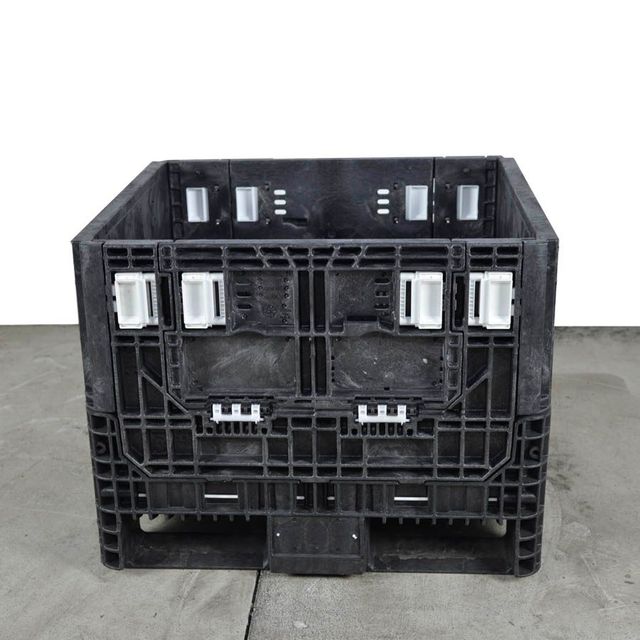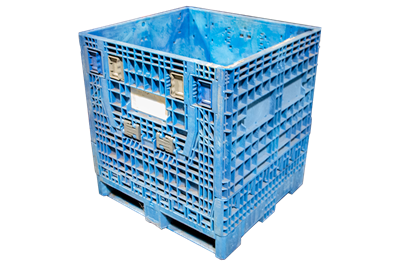Why Mass Containers Are Essential for Cost-Effective and lasting Transport
Mass containers play an essential role in modern logistics. They help with the reliable movement of large quantities of goods, thus maximizing transport procedures. This technique not just lowers expenses but additionally minimizes environmental influence with reduced discharges and waste generation. As sectors look for even more lasting practices, the fostering of bulk containers is coming to be progressively substantial. What ramifications does this shift hold for future logistics and supply chain management?

The Benefits of Using Bulk Containers in Logistics
Bulk containers reinvent logistics by boosting performance and sustainability. These containers permit for the transportation of large amounts of products in a solitary trip, substantially reducing the variety of journeys needed. This not just enhances procedures but also minimizes labor expenses connected with handling, loading, and unloading. On top of that, mass containers are developed to enhance area application within transport automobiles, making certain that more items can be shipped all at once.
The standardization of mass containers additionally streamlines the logistics process. With uniform dimensions, they can be easily stacked and kept, causing improved warehouse monitoring. In addition, mass containers typically include durable products that protect components from damages throughout transit, thus decreasing item loss and increasing general dependability. Because of this, businesses can experience boosted supply chain efficiency, inevitably bring about enhanced productivity and customer contentment. This combination of elements makes bulk containers a critical possession in contemporary logistics.
Ecological Impact: Lowering Waste and Carbon Footprint
As markets progressively focus on sustainability, the fostering of mass containers has become a key method for decreasing waste and decreasing carbon impacts. These containers reduce the usage of packaging products, such as boxes and plastic, thus significantly lowering general waste generation. By combining deliveries, bulk containers boost transportation efficiency, allowing for even more items to be transferred per trip. This decrease in trips straight correlates with reduced greenhouse gas emissions, adding to a smaller carbon impact.
Bulk containers can usually be reused or recycled, further mitigating ecological impact. The resilience of these containers guarantees they can stand up to several transport cycles, minimizing the need for single-use choices. used plastic containers. By streamlining logistics and promoting efficient resource usage, mass containers not only sustain lasting practices however additionally motivate industries to line up with international environmental goals. Eventually, their implementation mirrors a commitment to eco-friendly stewardship and accountable resource monitoring
Price Savings: How Bulk Containers Lower Transportation Costs
While numerous companies look for means to improve their profits, making use of bulk containers provides a significant possibility for decreasing transport expenses. Mass containers take full advantage of the quantity of items transported, allowing businesses to deliver larger amounts at when. This performance reduces the number of trips required, directly reducing gas expenses and reducing labor expenses related to loading and unloading.
Furthermore, bulk containers frequently include structured layouts that enhance area application within transportation vehicles. This implies less vacant spaces, causing more effective use of readily available capacity. The sturdiness of bulk containers can decrease the risk of item damage throughout transportation, making sure and minimizing losses that even more goods get here intact.
Enhancing Supply Chain Effectiveness With Bulk Storage Solutions
Bulk storage space options play an essential duty in boosting supply chain performance by maximizing supply administration. By settling goods right into less, bigger containers, companies can significantly minimize taking care of prices related to frequent transfers and handling. This streamlined strategy permits far better monitoring and monitoring of supply, inevitably leading to enhanced operational efficiency.
Structured Supply Management
Reliable supply management is vital for maximizing supply chain operations, particularly when companies adopt bulk storage space services. These solutions enable companies to maintain greater stock levels while lessening the regularity of replenishment. By settling materials into mass containers, business can simplify their supply procedures, lowering the complexity related to tracking numerous smaller plans. This strategy helps with precise supply matters and enhances forecasting precision, permitting even more educated decision-making. In addition, mass storage remedies simplify stockroom organization, making it less complicated to find and accessibility products when needed. Consequently, organizations can achieve a more effective supply turnover rate, ultimately improving overall supply chain efficiency and lowering the possibility of stockouts or overstock situations.

Lowered Handling Expenses
The implementation of bulk storage space remedies not just simplifies supply monitoring but likewise considerably lowers dealing with expenses throughout the supply chain. By consolidating materials into mass containers, business lessen the need for regular handling and transfer between different storage space and transport devices. This technique minimizes labor expenses related to loading, dumping, and moving smaller sized packages. Furthermore, bulk storage decreases the frequency of deliveries, bring about lower transportation expenses and reduced fuel usage. As an outcome, organizations can maximize their logistics procedures, permitting an extra effective allocation of resources. Ultimately, lowered dealing with expenses contribute to boosted general supply chain effectiveness, promoting a setting that supports both sustainability and economic viability.

Versatility of Bulk Containers Throughout Numerous Industries
Lots of markets have distinct demands for transportation and storage space, mass containers have arised as a versatile remedy that fulfills a large range of demands. These containers, varying from big containers to specialized tanks, can fit diverse materials, consisting of powders, liquids, and granules. In the farming sector, bulk containers facilitate the transportation of plant foods and grains, while the food and drink market uses them for active ingredients and finished items. The chemical sector counts on bulk containers for securely delivering harmful materials, making certain conformity with safety and security laws. In addition, building companies gain from mass containers for moving accumulations and various other materials. Their flexibility reaches numerous settings of transport, including ships, vehicles, and trains, boosting logistical performance. This versatility not only streamlines procedures across different industries however likewise promotes sustainability by decreasing packaging waste and maximizing space in transit. Therefore, bulk containers play an essential function in modern supply chain management.
Future Trends wholesale Container Usage and Sustainability
The future of bulk container use is significantly shaped by innovative materials growth that improves sustainability. Furthermore, automation in logistics assures to simplify operations, reducing waste and boosting performance. Embracing round economy methods will further transform exactly how bulk containers are created, used, and reused, promoting a much more lasting transport landscape.
Ingenious Products Development
As sectors progressively focus on sustainability, cutting-edge materials development in mass containers becomes a substantial factor in improving eco-friendly transportation solutions. Producers and researchers are exploring biodegradable plastics, recycled compounds, and lightweight steels to lower environmental impact. These materials not only decrease waste however also enhance gas efficiency by lowering the total weight of containers. Additionally, advancements in wise materials, which can adapt to differing problems, improve the toughness and functionality of bulk containers. The assimilation of these cutting-edge materials lines up with round economy principles, promoting reuse and recycling. As the demand for sustainable practices grows, the growth of such products will play a vital role fit the future of bulk container usage in logistics and transportation.
Automation in Logistics
Significant developments in automation are positioned to change logistics and the usage of bulk containers, boosting sustainability in transportation. Automated systems, consisting of drones and autonomous lorries, are improving the activity of mass containers, decreasing the dependence on conventional fuel-powered transport. These technologies maximize transmitting and loading processes, boosting and minimizing vacant miles fuel performance. Additionally, automated inventory management systems boost monitoring and tracking of bulk containers, ensuring much better source allotment and reduced waste. The integration of the Net of Points (IoT) enables real-time information analysis, allowing positive decision-making that lines up with sustainability goals. As automation continues to develop, it is expected to drive additionally technologies wholesale container use, ultimately sustaining even more lasting logistics techniques and reducing the ecological influence of transportation.
Circular Economy Practices
Developments in automation are establishing the phase for a much more integrated technique to round economic situation techniques in the domain of mass container use. As markets progressively welcome sustainability, bulk containers are being developed for long life and reusability. This change not just reduces waste but also boosts resource effectiveness. Business are embracing methods such as closed-loop systems, where utilized containers are gathered, refurbished, and reestablished right into the supply chain. In addition, clever modern technologies track container life cycles, assisting in far better administration and reducing ecological influence. The cooperation between manufacturers, logistics carriers, and end-users is necessary in developing criteria for sustainable container use. refurbished bulk containers. Future patterns indicate an expanding focus on materials that are eco-friendly and recyclable, more enhancing the round economy's concepts in bulk transportation

Often Asked Concerns
What Materials Are Mass Containers Normally Made From?
Mass containers are commonly created from click here sturdy materials such as high-density polyethylene, light weight aluminum, steel, and cardboard. These products give defense, stamina, and flexibility, making them appropriate for moving various products in different markets efficiently.
How Do I Select the Right Dimension Bulk Container?
Selecting the best dimension mass container entails evaluating the volume of products to be moved, thinking about managing equipment compatibility, and appraising storage room needs. Correct dimension assurances effectiveness in transport and decreases waste throughout shipment.
Are Bulk Containers Reusable or Recyclable?
Bulk containers are typically multiple-use, created for multiple trips, enhancing sustainability. Numerous can also be recycled, depending upon the products used. Selecting recyclable options further sustains environmental objectives and minimizes waste in transport techniques.
What Safety Rules Relate To Mass Container Transport?
Safety and security guidelines for mass container transport include conformity with the Department of Transportation standards, correct labeling of unsafe products, structural integrity analyses, and adherence to weight limitations to assure secure handling and stop mishaps during transportation.
Exactly How Can Companies Change to Making Use Of Bulk Containers Effectively?
Companies can transform to bulk containers by assessing existing logistics, educating staff on handling, buying ideal devices, enhancing stock administration, and teaming up with vendors to ensure compatibility and efficiency throughout the supply chain.
As markets increasingly focus on sustainability, the adoption of mass containers has emerged as an essential technique for minimizing waste and lowering carbon impacts. By consolidating materials right into bulk containers, business can streamline their inventory processes, lowering the complexity connected with tracking multiple smaller plans. As markets increasingly focus on sustainability, cutting-edge materials growth in bulk containers emerges as a significant variable in enhancing green transport options. Automated systems, consisting of drones and self-governing cars, are streamlining the activity of mass containers, reducing the reliance on standard fuel-powered transport. In addition, automated inventory administration systems boost monitoring and surveillance of bulk containers, making certain better resource allowance and reduced waste.